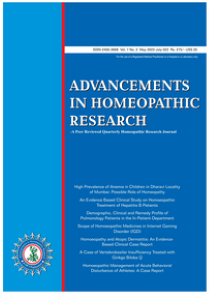Psoralea Corylifolia Conservation by Tissue Culture and Enhancement of Secondary Metabolites with Homoeopathy: A Narrative Review
DOI:
https://doi.org/10.48165/ahr.2024.9.2.3Keywords:
Homoeopathy, Agrohomoeopathy, Micropropogation, Plant tissue cultureAbstract
India has an extremely diverse range of plants, many of which have therapeutic applications. The rich resource is being over-exploited and is diminishing at an alarming rate. Therefore, it is crucial to adopt strategies for the sustainable management of resources derived from traditional medicinal plants. The diverse array of secondary metabolites found in plants not only imparts therapeutic effects but also forms the cornerstone of medicinal advancements in pharmaceutical formulations.
References
Namdeo, A. G. (2007). Plant cell elicitation for production of secondary metabolites: a review. Pharmacogn Rev, 1(1), 69-79.
Baskaran, P., & Jayabalan, N. (2007). Rapid micropropagation of Psoralea corylifolia L. using nodal explants cultured in organic additive supplemented medium. J Horticult Sci Biotechnol, 82(6), 908-913.
Pandey, P., Mehta, R., & Upadhyay, R. (2013). In vitro propagation of an endangered medicinal plant Psoralea corylifolia Linn. Asian J Pharm Clin Res, 6(3), 115-118.
Sen, S., Chandra, I., Khatun, M. A., Chaterjee, S., & Das, S. (2018). Agrohomeopathy: An emerging field of agriculture for higher crop productivity and plant protection. IJRAR, 5(4), 52-56.
Nabi, N. G., Wani, T. A., & Kaloo, Z. A. (2021). In Vitro Conservation Strategies for Sustainable Production of Secondary Metabolites in Psoralea corylifolia L. Proc Natl Acad Sci India Sect B Biol Sci, 91, 959-970.
Khushboo, P. S., Jadhav, V. M., Kadam, V. J., & Sathe, N. S. (2010). Psoralea corylifolia Linn.— “Kushtanashini”. Pharmacogn Rev, 4(7), 69.
Khatune, N. A., Islam, M. E., Haque, M. E., Khondkar, P., & Rahman, M. M. (2004). Antibacterial compounds from the seeds of Psoralea corylifolia. Fitoterapia, 75(2), 228-230.
Won, T. H., Song, I. H., Kim, K. H., Yang, W. Y., Lee, S. K., Oh, D. C., ... & Shin, J. (2015). Bioactive metabolites from the fruits of Psoralea corylifolia. J Nat Prod, 78(4), 666-673.
Hao, W., Zhang, X., Zhao, W., & Chen, X. (2014). Psoralidin induces autophagy through ROS generation which inhibits the proliferation of human lung cancer A549 cells. PeerJ, 2, e555.
Alam, F., Khan, G. N., & Asad, M. H. H. B. (2018). Psoralea corylifolia L: Ethnobotanical, biological, and chemical aspects: A review. Phytother Res, 32(4), 597-615.
Pant, B. (2014). Application of plant cell and tissue culture for the production of phytochemicals in medicinal plants. In Infectious Diseases and Nanomedicine II: First International Conference (ICIDN–2012), Dec. 15-18, 2012, Kathmandu, Nepal (pp. 25-39). Springer India.
Baskaran, P., & Jayabalan, N. (2009). In vitro regeneration of Psoralea corylifolia L. through callus cultures. Plant Biotechnol, 26(3), 333-336.
Endler, P. C., Scherer-Pongratz, W., Lothaller, H., & Stephen, S. (2015). Wheat and ultra high diluted
gibberellic acid–further experiments and re-analysis of data. Homeopathy, 104(04), 257-262.
Shinde, A. N., Malpathak, N., & Fulzele, D. P. (2009). Optimized production of isoflavones in cell cultures of Psoralea corylifolia L. using elicitation and precursor feeding. Biotechnol Bioprocess Eng, 14, 612-618.
Capra, R. S., Gratão, A. S., Freitas, G. B., & Leite, M. N. (2014). Preparados homeopáticos e ambiente de cultivo na produção e rendimento de quercetina em carqueja [Baccharis trimera (Less) DC.]. Rev Bras Plantas Med, 16, 566-573.
Barreto, C. S., Homsani, F., Holandino, C., & da Silva, N. C. B. (2016). Plant tissue culture and ultra high diluted studies: suggesting a novel model using in vitro techniques. Int J High Dilution Res, 15(4), 45-49.
Chaturvedi, P., Mukherjee, S., & Chowdhary, A. Synergistic effect of Calendula (homeopathic medicine) and Jasminoic acid in overproduction of phenols in vitro.
Anis, M., & Faisal, M. (2005). In vitro regeneration and mass multiplication of Psoralea corylifolia—an endangered medicinal plant.
Saxena, C., Palai, S. K., Samantaray, S., Rout, G. R., & Das, P. (1997). Plant regeneration from callus cultures of Psoralea corylifolia Linn. Plant Growth Regul, 22, 13-17.
Bonato, C. M., Proença, G. T. D., & Reis, B. (2009). Homeopathic drugs Arsenicum album and Sulphur affect the growth and essential oil content in mint (Mentha arvensis L.). . Acta Sci Agron, 31, 101-105.
Ubessi, C. et al. (2021). Chemical composition of Chamomile essential oil cultivated with homeopathy. J Essent Oil Res, 33(4), 342-350.
Santos, F. M. et al. (2011). Characterization of essential oil and effects on growth of Verbena gratissima plants treated with homeopathic phosphorus. Nat Prod Commun, 6(10), 1934578X1100601023.
Cecon, P. R., & Reis, E. L. (2005). Essential oil and antimalarial compounds in plants of Bidens pilosa L. treated with the China homeopathy.
Andrade, F. M., Casali, V. W., & Cecon, P. R. C. (2012). Crescimento e produção de cumarinaemplantas de chambá (Justicia pectoralis Jacq.) tratadas com isoterápico. Revista Brasileira de PlantasMedicinais, Rev Bras Plantas Med, 14, 154-158.




